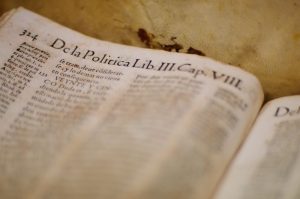Das iiif Consortium und die weitere iiif Community haben Standard-Protokolle definiert, wie man sie in der Darstellung von Bildressourcen benötigt. Die Protokolle sind als Beschreibungen von „Schnittstellen“ formuliert, d.h. es wird beschrieben, unter welcher Adresse, mit Hilfe welcher Parameter der Dienst eine bestimmte Funktion anbieten soll. In dieser Weise gibt es Beschreibungen von Zoom-/Rotations-/Ausschnitts-/Format-Konversions- und ähnlichen Diensten in der iiif image API, die aktuell in Version 2.1.1 vorliegt. Ferner Beschreibungen von Zugangsmanagement- und Authentifikationsservices sowie von Such-Funktionen in der Authentication API bzw. der Search API, beide jüngeren Datums und erst in der Version 1.0 vorliegend. Beschreibungen von Video- und Audio-Daten (z.B. für die in diesem Fall hinzukommenden Zeit-Indices der Ressourcen) sind in Vorbereitung.
Jahr: 2018
Kolloquium – Projekt „Die Schule von Salamanca“: „Perspectivas historiográficas y nuevos desafíos en la investigación sobre la Escuela de Salamanca“
 Vortragender: Juan Belda Plans [Webseite: https://juanbeldaplans.com/]
Vortragender: Juan Belda Plans [Webseite: https://juanbeldaplans.com/]
Datum: 15.6.2018
Zeit: 15.00-18.00
Ort: MPIeR
Raum: Vortragssaal des MPI
Organisation: Christiane Birr, José Luis Egío
Juan Belda Plans ist seit langem einer der renommiertesten Forscher zur spanischen Spätscholastik und hat nicht nur mit seiner kommentierten Übersetzung von Melchor Canos „De locis theologicis“, eines der wichtigsten Werke der spanischen Spätscholastik, Maßstäbe gesetzt. Wir freuen uns deshalb besonders, dass er im Rahmen des Projektkolloquiums ein Resümee der Forschungslage zur Schule von Salamanca ziehen und aus seiner Sicht neue Forschungsperspektiven aufzeigen wird.
Die Veranstaltungssprache ist Spanisch.
Scandalum und Menschenrechte – Kolloquium des Projekts „Die Schule von Salamanca“

Datum: 06.06.2018
Uhrzeit: 14:30 – 16:00
Organisation: Christiane Birr
Ort: Max-Planck-Institut für europäische Rechtsgeschichte
Raum: Vortragssaal des MPIeR
Im Juni-Treffen des Salamanca-Kolloquiums stellen José Luis Egío und Pedro Henrique Ribeiro ihre Arbeit zum Thema „Scandalum und Menschenrechte“ vor. Die Vortragssprache ist Deutsch.
José Luis Egío studierte Philosophie und Europäisches Recht in Murcia, Padua, Salamanca und Genf. Er promovierte an der Philosophischen Fakultät der Universität Murcia und arbeitet derzeit an einer weiteren Promotion am Instituto de Investigaciones Históricas an der Universidad Nacional Autónoma de México (UNAM). Er ist wissenschaftlicher Mitarbeiter des Akademienprojekts „Die Schule von Salamanca“ und assoziierter Wissenschaftler am Max-Planck-Institut für europäische Rechtsgeschichte.
Pedro Henrique Ribeiro studierte Sozialwissenschaften an der Universität zu Sao Paulo (USP) und Rechtswissenschaften an der Katholischen Universität Sao Paulos (PUC-SP). Er ist DAAD-Fellow und promoviert am Institut für Öffentliches Recht der Goethe-Universität (Lehrstuhl für Öffentliches Recht, Recht und Theorie der Medien).
(English) Working Paper: Duve on Global Knowledge Production
We are happy to announce the publication of the latest instalment in our series „The School of Salamanca Working Papers“ (ISSN 2509-5080):
Thomas Duve: La Escuela de Salamanca: ¿un caso de producción global de conocimiento? (2018-02)
Abstract
For a long time, the School of Salamanca has been regarded as a Spanish, Iberian, or European phenomenon. Again and again it’s projection from Salamanca into the world, to America and Asia, has been stressed. But is this perspective really appropriate for an analysis of the indisputably important role the School played in the development of a juridical-political language? Are we not rather confronted with a case of global knowledge production which is better understood with the methods of History of Knowledge than with those of the History of Science? These questions seem even more pertinent considering that the School of Salamanca was not only a group of learned discussions, but also a community of pragmatic norm production. This working paper offers a few thoughts about these questions which are meant to serve as a basis for discussion at a conference dedicated to this topic in October 2018 and also as a preparation for the chapters of a book on the School of Salamanca as a phenomen of global knowledge production.
Keywords
Global History, History of Knowledge, School of Salamanca
URLs
Working Paper: Cuena Boy on Contractus
We are happy to announce the publication of the latest instalment in our series „The School of Salamanca Working Papers“ (ISSN 2509-5080):
Francisco Cuena Boy: Contractus et quasi-contractus (2018-01)
Abstract
Ideally located in the writer’s position of the voice „contractus (& quasi contractus)“ of the Dictionary, the author of this paper tries to discover the difficulties that his drafting could imply. The difficulties encountered come mainly from the chronology and the diversity of profiles between the members of the Salamanca School that deal with contracts, from the unusual historical and material extension of the elements they work with and from the need to understand their methods, their initial assumptions and the aims they pursue. At the end, some practical considerations are offered to the voice’s drafting.
Keywords
Contract, Luis de Molina, Leonardo Lessius, Domingo de Soto, School of Salamanca
URLs
(English) Presentation of the Digital Edition Platform of the Project „The School of Salamanca“: Francisco de Vitoria’s „Confessionario“
As a result of several years of working on the digital edition of texts of the School of Salamanca, and although the edition still is (and will remain) a ‚work in progress‘, the School of Salamanca project will officially release its digital edition as an online portal for research on the texts of the School of Salamanca on 9 May 2018.
The release of the digital edition will take place within the scope of a workshop on the Confessionario Útil y Provechoso by Francisco de Vitoria, one of the texts in the central group of works of the digital edition, and a work that is already edited to a great extent following the project’s extensive text preparation and annotation processes.
Following the discussion of Vitoria’s ‚Confessionario‘, the project will present the web application of the digital edition by means of a small ‚tech demo‘, during which the web application’s functionalities shall be explained by taking the example of the previously discussed work.
Organization: The ‚School of Salamanca‘ Project
Place: Max Planck Institute for European Legal History
Date & time: 9 May 2017, 18.00-19.30
Programme:
– Christiane Birr: Introduction
– José Luis Egío Garcia: Epitomisation Processes and the Historiography on Vitoria’s „Confesionario“
– Manuela Bragagnolo: Epitomizing Knowledge between Portugal and Spain. On Martin de Azpilcueta’s „Manual de Confessores“
– David Glück / Andreas Wagner: The Online Edition of The School of Salamanca as a Digital Research Platform
(The papers will be complemented by further discussions involving the audience.)
(English) Code Release and Open-Source Development of the ‚School of Salamanca‘ Web Application
On 1 March 2018, we have released the code of the web application of the ‚School of Salamanca‘ project’s digital edition (https://salamanca.school) as free and open source software (under the MIT license) on GitHub: https://github.com/digicademy/svsal, where the development process and the versioning of our web application takes place exclusively from this date onward. The publication of our web application’s code represents the first major code release of the project; other parts of our digital infrastructure and the research data will be published separately.
The web application, now having reached version 1.0, has been developed since 2014 and, more precisely, consists of an eXist-db application package. While this package can be downloaded and deployed in any eXist-db (version 3.6+) instance, it must be mentioned that, in order to function correctly, the web application draws upon the integration with further, external services: for example, an iiif-conformant image server (image and presentation APIs) allowing for the incorporation of facsimile images in the reading views of our works, or a SphinxSearch server providing lemmatized and cross-language search results for the texts. Notwithstanding these current caveats in portability of the application package, and although there still remains much to be achieved with regards to the functionality of our web application, the code underlying central features of the application (such as the endless-scrolling segmentation of texts in the reading view, the content negotiation-based URI-linking of texts and text segments, and others) is fully available now and can be utilized or serve as an example for similar projects, for instance. For a more extensive and detailed description of current features, caveats, and provisos of the application please refer to: https://github.com/digicademy/svsal.
The software is tagged with a DOI so that it can be cited: https://doi.org/10.5281/zenodo.1186521
